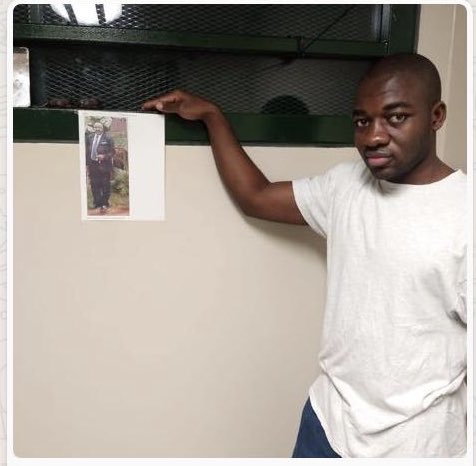An asylum seeker hoping to make his way to Canada has been deported back to Cameroon, where he believes he could be executed over his participation in a peaceful protest in 2017.

Kenneth was pulled from a plane heading from the United States to Cameroon on Oct. 13 after officials with Canada Border Services Agency agreed to a meeting on Oct. 30, but when the time came for his CBSA meeting, officials with the United States Immigration and Customs Enforcement, or ICE, chose not to release him from custody.
Global News has agreed not to use the 29-year-old’s full name to protect the identity of family members.
London Abused Women’s Centre executive director Megan Walker, who had been advocating for Kenneth, told Global News on Thursday that at 3:30 p.m. Wednesday she was sent a photo of a plane taking off from Texas on its way to Cameroon with roughly 90 passengers on board.
“Kenneth was one of those passengers. Like many of the passengers, they had outstanding appeals before the courts. Some had recommendations of a stay of deportation. All of that was thrown in the garbage,” she said.
“It’s been a horrific 24 hours.”
On Oct. 9, Amnesty International called on the U.S. government to refrain from deporting anyone to Cameroon, saying “it is extremely likely that anyone who is returned to Cameroon will face a high risk of being detained, beaten, disappeared, tortured, or possibly even killed.”

Get daily National news
Cameroon is divided along lines created during colonialism by European powers and was first ruled by Germans and then divided among the French and British.
As a result, there are English- and French-speaking regions, with English speakers like Kenneth estimated at about 20 per cent of the population.
Amnesty International says long-standing tensions in Cameroon escalated in late 2016 “after a series of strikes and protests against what teachers, lawyers and students viewed as further discrimination against Anglophones.”
Walker says she’s been encouraged by the overwhelming support she’s received from community members asking how they can help.
However, she said she is “disappointed in my government” and argued that Canadian politicians did not do enough for Kenneth.
“They chose not to intervene because of excuses like, ‘well, the U.S. is a sovereign nation and we can’t intervene.’ And for me, when there is a known human-rights violation, we have a responsibility as a government to intervene.”
London North Centre MP Peter Fragiskatos says he felt “disappointment and sorrow” to learn that Kenneth had been deported back to Cameroon, but he said Canadian politicians “did everything that they could.”

Fragiskatos first learned about the case from Walker back on Oct. 11 and began engaging with Public Safety Canada and Immigration, Refugees and Citizenship Canada (IRCC). Roughly 72 hours later, a CBSA meeting had been secured, though Kenneth never made it to that meeting as he remained in the custody of ICE.
“The reality is, and we have discussed this as well in the past, this was a matter for U.S. authorities to decide on,” he told Global News.
“They had sovereignty over this. And while certainly I was hopeful, and other officials within the government who I worked with on this did their level best to reach out to counterparts in the United States, it did not turn out the way that we had hoped.”
- U.S. Election 2024: Questions arise over groups door-knocking for Donald Trump
- Hezbollah launches overnight rocket barrage in response to Israeli attacks
- Harris pushes for second debate while Trump declines because early voting has started
- FBI agents board vessel managed by company whose other cargo ship collapsed Baltimore bridge
When asked if there were any options still available for Kenneth’s case, Fragiskatos said that outside of intervention from the U.N. Human Rights Commission, which he says seems unlikely given that it hasn’t happened already, “there is no hopeful outcome.”
“But in a more general sense, Canada can continue to raise its voice and work with like-minded countries to emphasize the need for a compassionate and humanitarian response to issues relating to asylum-seeking and everything around the matter of refugees.”
Walker said she and other advocates will be working to try to “find out who was on that plane and see if we can track them in any way to see if they have survived or not.”
“Specifically Kenneth, who really represented this incredible issue,” she said.
“When the next set of immigrants comes into the United States to request asylum status, we’re going to help them as well.”











Comments